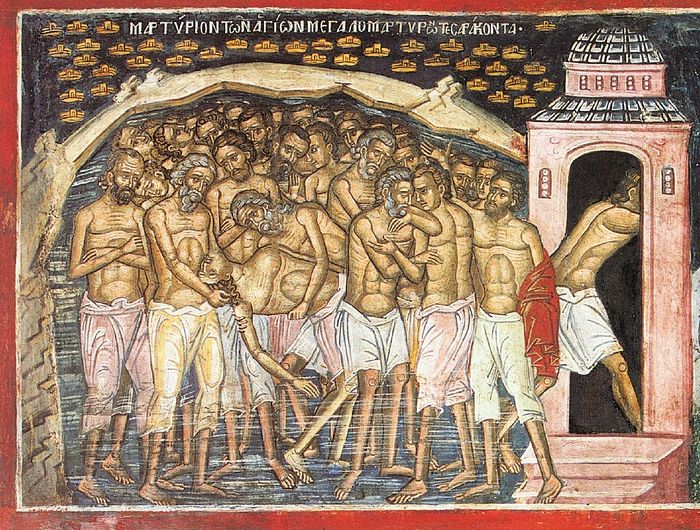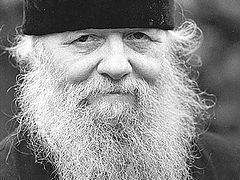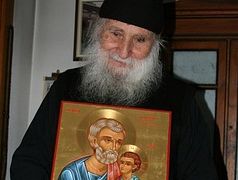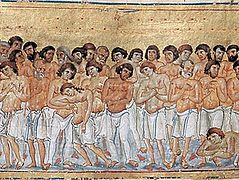The feast of the Forty Martyrs of Sebaste has always been a great event in the Orthodox Church. From antiquity, from the very time of their martyrdoms in 320, the Church has festively glorified these saints. They accepted suffering for Christ before the victory of Christianity in the Roman Empire. The famous Edict of Milan was already adopted then, allowing the freedom of the Christian religion, but there were still isolated flares of persecution before the complete victory, when Christianity was established throughout the entire Roman Empire. It sometimes happens: A war is ending, and on the eve of victory, somebody accepts death.
These soldiers accepted suffering for Christ in the icy lake of Sebaste. Their deaths were especially glorious because they had the opportunity to escape suffering. A warm bathhouse was kindled on the shore of the lake, and any one of them could have left his place of torment and taken refuge in this salvation.
Their podvig is memorable for us because one of the soldiers did not endure, but preferred a safe, prosperous life without Christ to death with Christ. One of the guards saw this. According to inscrutable Divine providence, it was revealed to him that life and glory were there where these martyrs were standing. There was a warmth that can never be found anywhere; there was the Lord Himself. Seeing the martyric crowns descending upon the soldiers, he cried out, “I too am a Christian!” and joined them in order to share in their suffering, and glory.
From the very beginning, the Church saw in this image that which determines the life of every Christian and the life of the whole Church at all times. In one way or another, we find ourselves before this choice. Either we must sacrifice Christ for the sake of wellbeing, or sacrifice our wellbeing for the sake of Christ. There is not a single person who can bypass this choice.
But there are those trials that grip the whole Church. Those persecutions that occurred in the ancient Church and that occurred in most recent times were marked by this: Some chose Christ, and others rejected Him. Some denied Him when they were already close to receiving the martyric crown, while among people who were indifferent to the Church, and even among its persecutors, confessors of faith were suddenly found.
How does election by the Lord take place? We hear today in the Gospel about how the mystery of salvation of every man is deep, and the Lord Who reads human hearts alone knows who will persist in the hour of trials, and who will renounce faith. It makes no difference when someone is called to the Lord—among the first or among the last. It’s possible to be as if with Christ in the Church your whole life and to renounce Christ in the final hour. And an entire people can be as if with God, and then reject Him, as it was with the God-elected people of Israel.
How mysterious is the providence of God! Some come at the first hour, others at the third, at the sixth, others later, and some, it turns out, when, they, ostensibly, would already have absolutely no hope left—at the eleventh hour. The Lord calls some to Himself when they are in the prime of their youth, others at the time of maturation, and others when they’ve already reached the sunset of their life. Some can reach the Lord within one hour, like the Wise Thief, but for others, an entire life is not enough to come to Christ.
The book of Revelation of the apostle John the Theologian speaks about the mysterious Heavenly city, having twelve gates that are always open, both day and night (Reve. 21). There is a gate facing East and there is a gate facing West. Some people enter this Heavenly city when their life is only just beginning to mount up, as the sunrise, and others when their life is approaching night.
The Lord calls some when they are, as they say, full of days and labors, and have managed to accomplish much here, on Earth; others when they are only standing on the threshold of adult life, filled with some, perhaps, very noble aspirations; and others before they’ve even begun to live.
The Lord accepts everyone equally regardless of when, at what hour, at what age they are called to Him. He is compassionate to all, and especially to those who cannot come to Him; to those who stand until the eleventh, final hour, as workers who want to labor, who want to employ all of their abilities and talents in life, but do not find a use for them.
Nobody needs them; perhaps they don’t have any special talents, and therefore nobody needs them. The Lord is always full of deep compassion for such people. He also invites them to Himself, and gives them His labor, which, as it turns out, is in no way less than the labor of other people. And we are amazed to see with what generosity the Lord endows all who come to Him. Some labored for an entire day, others for all of an hour, enduring neither the heat nor not the difficulties of the day. But he gives them all the same payment.
To us is revealed a very important mystery of our spiritual life—that, in fact, the Lord accepts not the number of our labors, but our love, and most importantly, the inner content that fills what we do.
Sometimes a man brings a lot to church, and the Gospel says that many that were rich cast in much (Mk. 12:41). Some “new Russian” wants to donate a lot of money, acquired in some unknown way, and the question arises whether the Church can accept his gift. And Sometimes a man is like that widow who put in her meager mite, and the Lord says that she offered more than all, for all they did cast in of their abundance; but she of her want did cast in all that she had, even all her living (Mk. 12:44).
This is what defines the life of a man and what he comes to the Church with. It’s clear: Sometimes a child gives his beloved mama an unskilled drawing for her birthday, and what can this gift mean? But his mother shines with joy, and it is more valuable than any other gift. The Lord evaluates what we bring in exactly the same way, only to an infinitely greater degree. Let us hearken to this secret of life, praying for our departed, remembering our New Martyrs of Russia.
Judging by Scripture, the trials that were in the fourth and in the twentieth centuries yet await the Church in the very at the final turning of history—those trials when every man, the whole Church, all of mankind must stand before a choice—that fearful choice that people made when they shouted, “Not Him, but Barabbas;” before that choice that someone made, preferring these “warm bathhouses”—life in all its seductive diversity—to Christ. This will be the last choice before the end of the world. It is already happening before our eyes.
My son, give me thine heart (Prov. 23:26), says the Lord. Someone could engage in grandiose activities, as if they are Christian, and could hold a very important place in the Church, and someone could be unknown by all, humbling fulfilling his daily duties. But the Lord will test the heart and receive all not by their external ministry, but by what spirit filled the man in his ministry: whether he was open to the generosity of Christ and His boundless love, revealed to us by the Cross.
The Forty Martyrs sanctify the whole holy Forty Days by their podvig. The Forty Martyrs give us the opportunity to be born or to die: to die to sin and to be confessors for the truth and righteousness of Christ—those who salute death with Christians are ready to despise that life in which there is no Christ.




